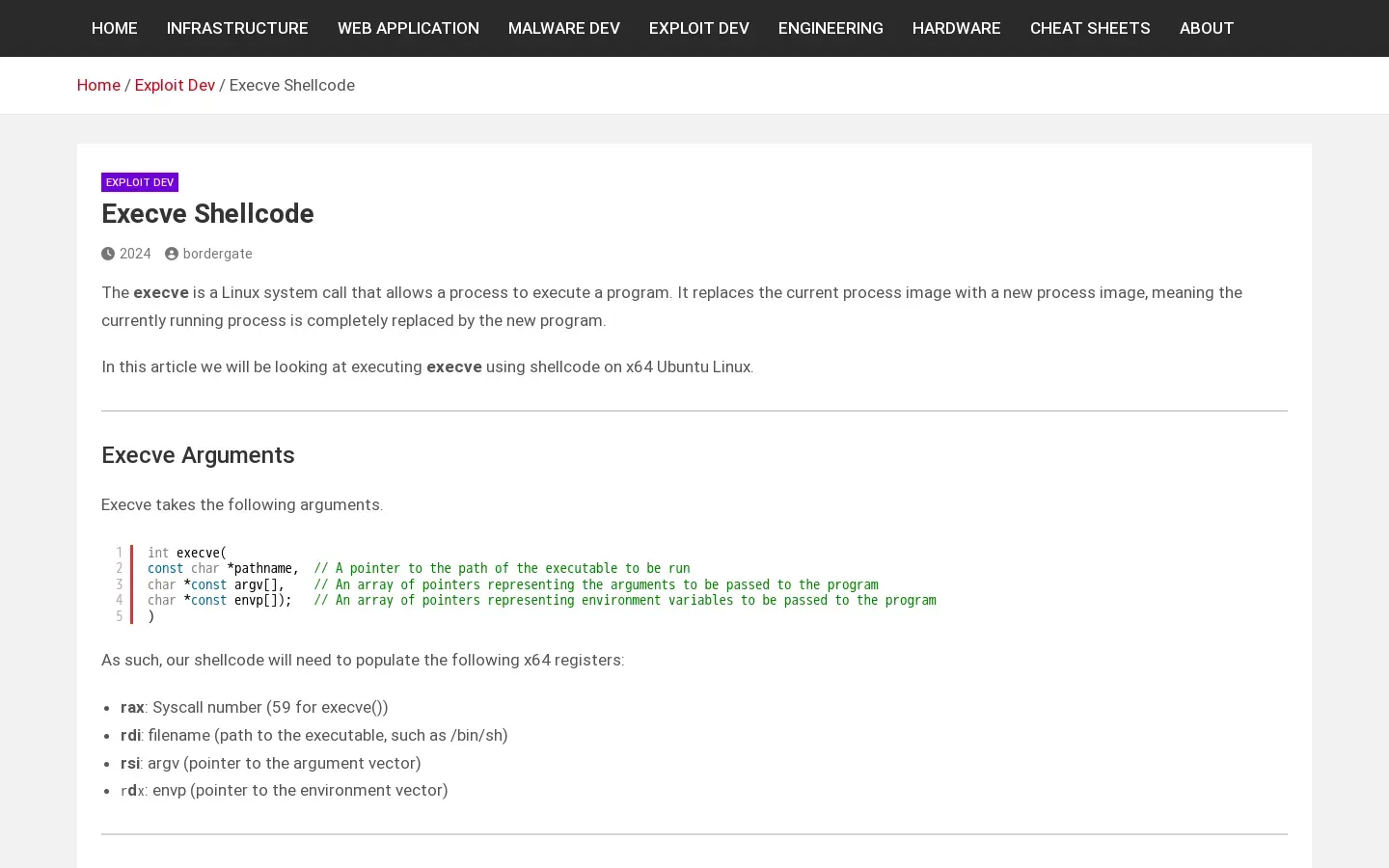
Understanding `execve` System Call and Shellcode Execution
/ 3 min read
Quick take - The article provides an overview of the execve system call in Linux, detailing its functionality, register requirements, debugging techniques, and common pitfalls to avoid when executing shellcode and developing system-level programs.
Fast Facts
- The
execvesystem call (syscall number 59) replaces the current process image with a new program, requiring correct population of x64 registers (rax,rdi,rsi,rdx) for successful execution. - Debugging shellcode can be enhanced using a Python script with the Keystone engine, allowing for assembly code modification without recompilation.
- Relaxing ptrace security restrictions may be necessary for effective debugging with tools like GDB, which might require a system reboot.
- Testing shellcode in a controlled environment is crucial; developers should pause execution in GDB to inspect code behavior and verify functionality with provided C examples.
- Common pitfalls include incorrect register population, ignoring ptrace restrictions, and misconfiguring SetUID binaries, which can lead to security vulnerabilities.
Understanding the execve System Call and Shellcode Execution in Linux
The execve system call is a cornerstone of the Linux operating system, pivotal for executing new programs by replacing the current process image. This capability is essential for system-level programming and shellcode execution, offering developers a powerful tool to manage processes. Recent tutorials have shed light on leveraging execve, emphasizing techniques, common pitfalls, and tools that can streamline development and debugging.
Functionality of execve
At its core, the execve system call, identified by syscall number 59, is responsible for executing a new program within a process. It requires three primary arguments: the filename (path to the executable), argv (argument vector), and envp (environment vector). When invoked, execve completely replaces the existing process image with the new program, effectively removing the previous program from memory. This makes it indispensable for tasks requiring precise control over process execution.
Register Utilization
For successful execution of the execve syscall on x64 systems, correct register population is crucial:
rax: Must hold the syscall number (59 forexecve).rdi: Should point to the filename.rsi: Needs to reference the argument vector.rdx: Must point to the environment vector.
Incorrectly setting these registers can result in crashes or erratic behavior, underscoring the importance of precision in system-level programming.
Debugging Techniques
Debugging shellcode can be challenging, but using a Python script with the Keystone engine simplifies this process. This combination allows developers to modify assembly code dynamically without recompilation, enhancing troubleshooting efficiency. Additionally, tools like GDB (GNU Debugger) are invaluable for pausing execution at critical points to inspect code behavior.
Ptrace Security Restrictions
When debugging with tools like GDB, ptrace security restrictions can pose challenges. These restrictions may need to be relaxed to attach successfully to target processes. Adjusting these settings often requires a system reboot but is necessary for effective debugging. Developers should be aware of these constraints and plan accordingly.
Testing and Verification
Testing shellcode in a controlled environment is vital. By pausing at the first instruction in GDB, developers can gain insights into their code’s functionality. It’s also recommended to verify shellcode performance using C code examples outside of debugging environments to ensure reliability and correctness.
Common Pitfalls to Avoid
Developers must be vigilant about several common mistakes:
- Incorrect Register Population: Misconfigured registers can lead to significant issues.
- Ignoring Ptrace Restrictions: Overlooking these can hinder debugging efforts.
- Misconfiguring SetUID: Improper handling of SetUID binaries can introduce security vulnerabilities.
The execve system call offers robust functionality for executing new programs within Linux environments. However, developers must navigate its limitations and potential pitfalls carefully. By employing recommended tools such as Python scripts, the Keystone engine, and GDB alongside proper debugging practices, developers can effectively leverage execve for advanced system programming and shellcode execution.



